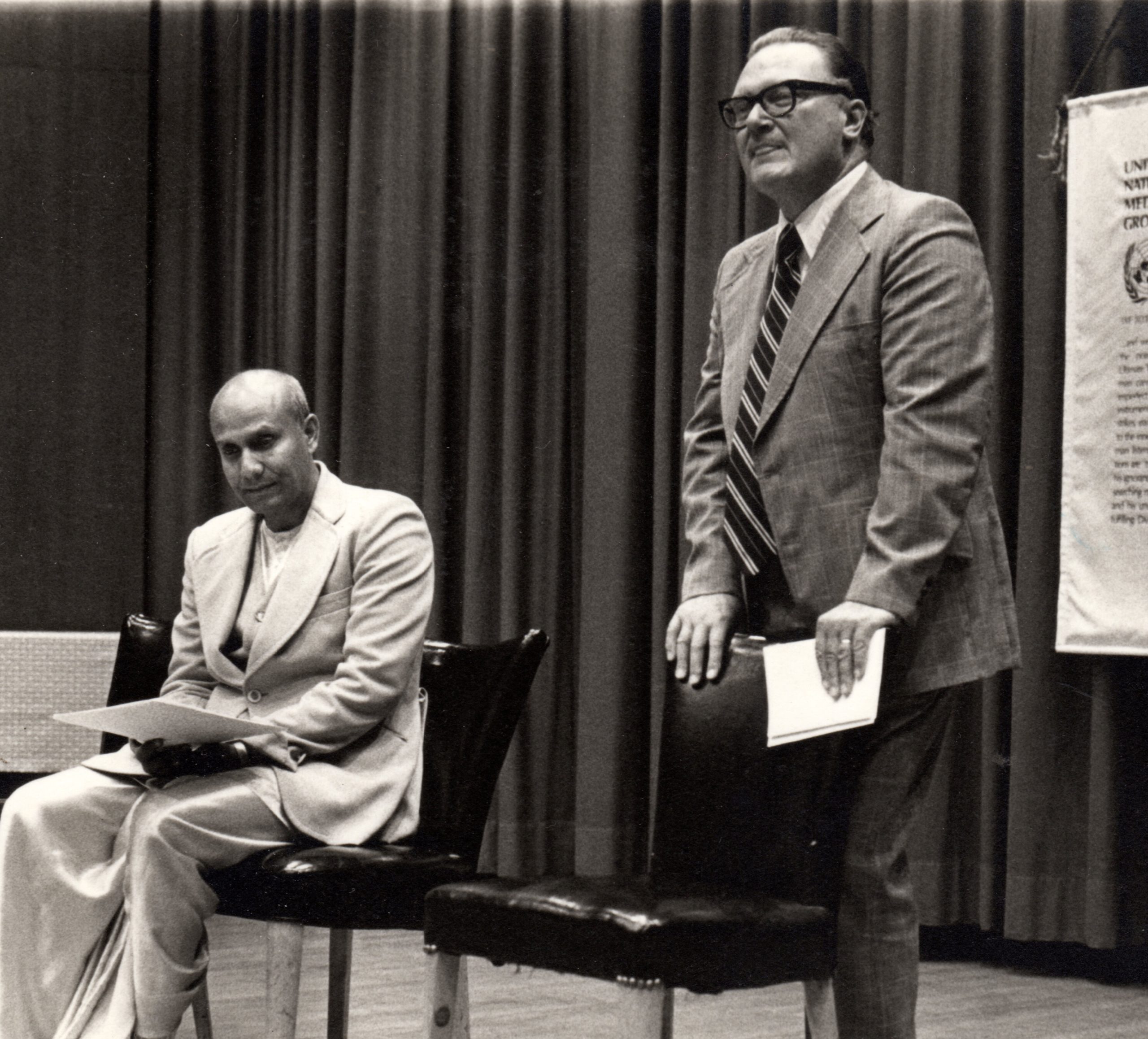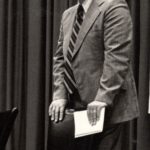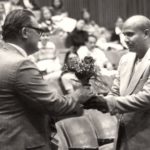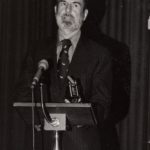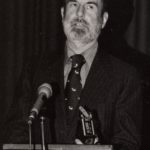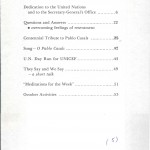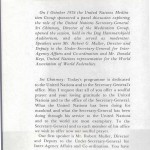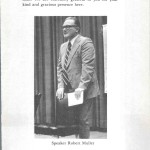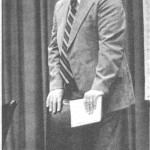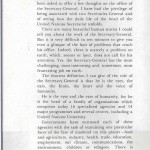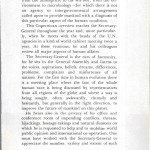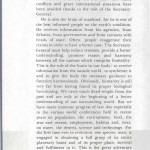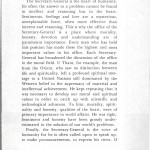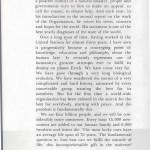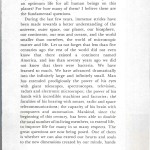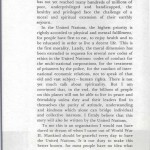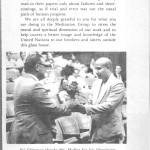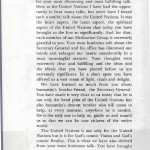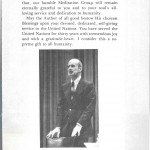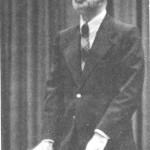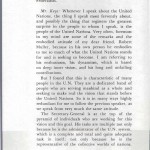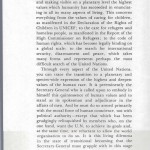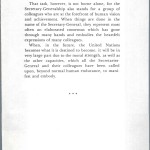Dedication to UN and Secretary-General’s Office 01 Oct 1976
Filed under Thoughts from the UN community. | Tributes and Expressions of appreciationOctober 1976 the Meditation Group at the UN sponsored a panel discussion exploring the role of the UN Secretary-General. Sri Chinmoy, Leader of the Meditation Group, opened the session, held in the Dag Hammarskjold Auditorium. Speakers were
- Robert G. Muller, Director and Deputy to the Under-Secretary-General for Inter-Agency Affairs and Co-ordination and
- Donald Keys, United Nations representative for the World Association of World Federalists.
Sri Chinmoy: Today’s programme is dedicated to the UN and to the Secretary-General’s office. May I request that all of you offer a soulful prayer and your loving gratitude to the United Nations and to the office of the Secretary-General. What the United Nations has been doing for mankind and what the Secretary-General has been doing through his service to the UN and to the world are most exemplary. To the Secretary-General and to each member of his office we wish to offer now our soulful prayer.
Robert Muller: The Secretary-General has the most challenging, interesting and, sometimes, frustrating job on earth. The shortest definition 1 can give of the role of the Secretary-General is that he is the eyes, the ears, the brain, the heart and the voice of humanity.
Eyes: The Secretary-General is the head of a family of specialized agencies, major programmes and several centres, including a UN University. Each examining one particular facet on this planet – food and agriculture, industry, health, trade, education, employment, our climate, communications, the environment, children or refugees. This Copernican overview reaches the Secretary-General throughout the year. He and colleagues review all major aspects of human affairs.
Ears: The Secretary-General is the ears of humanity, for he sits in the General Assembly and listens to the voices, aspirations, beliefs, dreams, differences, problems, complaints and misfortunes of all nations. The whole human race is being discussed by representatives from all regions where a way is being sought, often awkwardly, and hesitantly, but generally in the right direction, to improve the future of mankind. He hears in the privacy of his office and conference room of impending conflicts, threats, hijackings, hostage-takings and natural disasters and requests to help mobilise international co-operation.. Alas, nobody will ever know how many conflicts and grave international situations have been avoided thanks to the role of the Secretary-General.
Brain: He one of the best informed people on the earth’s condition. Often, people exaggerate their claims in order to have a better case. The Secretary-General must help reduce tensions, provide a better understanding, promote reason and harmony between all the nations which comprise humanity. This is the role of the brain in our body: to receive information from the outside world, to synthesize it and to give the body the necessary guidance to function harmoniously. Obviously, humanity is still very far from having found its proper biological functioning. We are only at the beginning of a better understanding of our surrounding world. But we have made immense progress One species, is engaged in obtaining a full grasp of its entire planetary home and of its proper place, survival and fulfilment in this great adventure .
Heart: Often the answer to a problem cannot be found in intellect and reasoning but in the heart. Sentiments, feelings and love are a mysterious, unexplainable force, often more effective than interest and reasoning. This is why the office of the Secretary-General is a place where morality, honesty, devotion and understanding are of paramount importance. the highest and most important values. Each Secretary-General has broadened the dimension of the office in the moral field. U Thant left a profound spiritual message …that it was necessary to develop our moral and spiritual values in order to catch up with scientific and technological advances. To him, morality, spirituality and honesty, qualities of the heart, were of primary importance in world affairs.
Voice of humanity: The Secretary-General is often called upon to make pronouncements, to express his views. If there is an outburst of violence, a war, a possible conflict or a natural disaster, people and governments turn to him to make an appeal, to call for reason, to obtain help. And each year, in his introduction to the annual report on the work of the Organisation, he voices his views, concern and hopes for the world.
The United Nations represents one of humanity’s greatest attempts ever to fulfil its destiny on planet Earth. We have gone through a very long biological evolution, a very complicated and hard history.
The fundamental question is: How best can we fulfil ourselves physically, intellectually, morally and spiritually? How can we provide an optimum life for all on this planet? For how many? These are the fundamental questions. Five centuries ago, most did not know a continent named America, and scores ago did not know that there were bacteria. We have advanced dramatically into the infinitely large and infinitely small. Mankind has been able to extend and improve life for many. Can we also extend our hearts and souls to the new dimensions created by our minds, hands and senses. While physical and mental fulfilment has not yet reached many hundreds of millions, the healthy and privileged face the challenge of a moral and spiritual extension of their earthly sojourn. In the UN, the highest priority is rightly accorded to physical and mental fulfilment, for people have first to eat, to enjoy health and to be educated in order to live a decent life. This is the first morality. The moral dimension has been extended to requests for new codes of ethics in the UN: conduct for multi-national corporations, treatment of prisoners, conduct of inter-national economic relations, and the vast subject of human rights.
There is not yet much talk about spirituality. But I am convinced that, the billions of people on this planet will not be able to live in peace and friendship unless they and their leaders find in themselves the purity of attitude, understanding and kindness which alone. can bridge individual and collective interests.
The United Nations is an organisation I would not have dared to dream of when 1 carne out of World War II. Most people have no idea what it really is and does in the face of truly herculean idiosyncrasies and challenges. They read about failures and short-comings, as if trial and error was not the usual path of human progress. We are all deeply grateful to you for what you are doing in the Meditation Group to stress the moral and spiritual dimension of our work and to help convey a better image and knowledge of the United Nations to our brothers and sisters outside this glass house.
 Sri Chinmoy thanks Mr. Muller for his illumining talk.
Sri Chinmoy thanks Mr. Muller for his illumining talk.
Sri Chinmoy: We are extremely grateful for your most illumining and fulfilling talk. Here at the UN I have had the opportunity to hear many talks, but never have I heard such a soulful talk about the United Nations. It was the heart aspect, the inner aspect, the spiritual aspect of the United Nations that today you have brought to the fore so significantly. And for that, each member of our Meditation Group is extremely grateful to you. Your talk about the Secretary-General and his office has illumined our minds and enlarged our hearts in a most meaningful manner. Your thoughts were extremely clear and fulfilling, the ideas and ideals are extremely significant – a vast ocean of light, truth and delight. We have learned much. The Secretary-General you have made clear is not only the head pilot of the UN but will help to guide us so that we can be true citizens of the entire world. The UN is not only for the United Nations but it is for God’s cosmic Vision and Reality. You have brought forward the inner spirit of the UN illuminingly. For that, our humble Meditation Group will remain eternally grateful to your soul’s all-loving service and dedication to humanity. May the Author of all good bestow His choicest Blessings upon your devoted, self-giving service. You have served the United Nations for thirty years with tremendous joy and with a gratitude-heart. 1 consider this a supreme gift to all humanity.
Mr. Donald Keys: Possibly the thing that registers the greatest surprise in the people to whom 1 speak, is the people of the United Nations. Foremost in my mind are remarks and embodied attitude of my dear friend, Roben Muller. I am referring to his enthusiasm, dynamism which is based on deep inner vision, and his long and unfailing contributions. This is characteristic of many people in the UN. A dedicated band of people who are serving mankind as a whole and seeking to make real the vision that stands before the United Nations. The Secretary-General is at the top of the pyramid of individuals who are working for this vision and goal. His tasks are multiple not only because he is the administrator of the UN system, a complete task in itself; he is the representative of nations, trying to implement the decisions and wishes of the General Assembly and the Security Council, which again, is a very complete and extraordinarily difficult task; but also because of the variety cultural histories and back-grounds which the members bring to the world organisation. These various elements are its greatest riches and, at the same time, a temporary source of discord and misunderstanding which the Secretary-General himself must be in the position to harmonise.
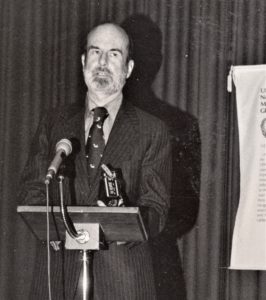
1976-10-01oct-dedicate-to-UN-SG-office-D-Keys-World-Feeralists
Most importantly, the Secretary-General is the spokesman for that which is in the process of becoming and being born. The Secretary-General embodies the conscience of the human race, and represents a kind of force that goes beyond his specific tasks. He represents that higher force. He speaks for the people, members of the Secretariat and members of the delegations who also stand for that vision. And he, like they, has the very difficult task of responding to national needs and aspirations and, at the same time, trying to embody and respond to a greater vision.The United Nations is in the process of elevating the highest values which humanity has succeeded in enunciating. This concerns caring for children, refugees and homeless people, to the code of human rights. The search for international security, disarmament and peace represents perhaps the most difficult search of the United Nations. Through every aspect of the UN, you can trace the transition to a species-wide expression of the deepest values of the human race. It is preeminently the Secretary-General who is called upon to embody this as its spokesman and adjudicator. He must do so armed primarily with the moral force of human conscience, not with political authority-except that which has been grudgingly relinquished by members who, on the one hand, want the UN to achieve its goals and, at the same time, are reluctant to allow the world organisation to do so. It is this living dilemma in the state of transitional becoming that the Secretary-General must grapple with in this stageof human history. This is why the post bears such an enormous burden. That task, however, is not borne alone. When things are done in the name of the Secretary-General, they represent most often an elaborated consensus which has gone through many hands and embodies the heartfelt expressions of many colleagues. When, in the future, the United Nations becomes what it is destined to become, it will be in very large part due to the moral strength, as well as the other capacities, which all the Secretaries-General and their colleagues have been called upon, beyond normal human endurance, to manifest and embody.[i]
[i] Meditation at the UN 1976-10-27-Vol-04-No-10-_Page_26-21
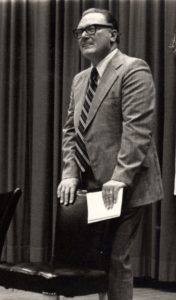 Mr. Muller.’ I t is a great honour for me to have been asked to offer a few thoughts on the office of the Secretary-General. 1 have had the privilege of being associated with two Secretaries-General and of seeing how the daily life of the head of the United Nations Secretariat unfolds. There are many beautiful human stories 1 could tell you about the work of the Secretary-General. But it is very difficult in ten minutes to give you even a glimpse of the host of problems that reach his office. Indeed, there is scarcely a problem on earth, which, sooner or later, does not call for his attention. Yes, the Secretary-General has the most challenging, most interesting and, sometimes, most frustrating job o n earth. The shortest definition 1 can g ive of the role of the Secretary-General is that he is the eyes, the ears, the brain, the heart and the voice of humanity. He is the eyes and the ears of humanity, for he is the head of a family of organisations which comprises today 16 specialized agencies and 14 major programmes and several centres, including a United Nations University. Governments have entrusted each of these agencies with the task of examining one particular facet of the fate of mankind on this planet-food and agriculture, industry, health, trade, education, employment, our climate, communications, the environment, children or refugees. There is scarcely a problem-from outer space to the atom, from the atmosphere to the sea-bed, from the environment to microbiology-for which there is not an agency or intergovernmental arrangement called upon to provide mankind with a diagnosis of this particular aspect of the human condition. This Copernican overview reaches the Secretary-General throughout the year and, more particular-ly, when he meets with the heads of the U.N. agencies in a kind of world cabinet meeting twice a year. At these reunions, he and his colleagues review all major aspects of human affairs. The Secretary-General is the ears of humanity, for he sits in the General Assembly and listens to the voices, aspirations, beliefs, dreams, differences, problems, complaints and misfortunes of all nations. For the first time in human evolution there is a meeting place where the fate of the whole human race is being discussed by representatives froID all regions of the globe and where a way is being sought, often awkwardly, clumsily and hesitantly, but generally in the right direction, to improve the future of mankind on this planet. He hears also in the privacy of his office and conference room of impending conflicts, threats, hijackings, hostage-takings and natural disasters on which he is requested to help and to mobilise world public opinion and international co-operation. One must have worked with the Secretary-General to appreciate the number, variety and extent of such demands. Alas, nobody will ever know how many conflicts and grave international situations have been avoided thanks to the role of the Secretary-General. He is also the brain of mankind, for he is one of the best informed people on the earth’s condition. He receives information from his agencies, from debates, from governments and from contacts with heads of state. Often, people exaggerate their claims in order to have a better case. The Secretary-General must help reduce tensions, provide a better understanding, promote reason and harmony between al! the nations which comprise humanity. This is the role of the brain in our body: to receive information from the outside world, to synthesize it and to give the body the necessary guidance to function harmoniously. Obviously, humanity is still very far from having found its proper biological functioning. We carry much dead-weight from the past and are only at the beginning of a better understanding of our surrounding world. But we have made immense progress of late due especially to the various world conferences held in recent years on population, the environment, food, the seas and oceans, employment, habitat and, next, on water, the deserts, science and technology. For the first time ever in evolution, one species, man, is engaged in obtaining a full grasp of its entire planetary home and of its proper place, survival and fulfilment in it. This is the great adventure 10 which is taking place on little planet Earth, forlorn in an isolated corner of the universe. The Secretary-General is the heart of humanity, for often the answer to a problem cannot be found in intellect and reasoning but in the heart. Sentiments, feelings and love are a mysterious, unexplainable force, often more effective than interest and reasoning. This is why the office of the Secretary-General is a place where morality, honesty, devotion and understanding are of paramount importance. Every man who has held this position has made these the highest and most important values in his office.
Mr. Muller.’ I t is a great honour for me to have been asked to offer a few thoughts on the office of the Secretary-General. 1 have had the privilege of being associated with two Secretaries-General and of seeing how the daily life of the head of the United Nations Secretariat unfolds. There are many beautiful human stories 1 could tell you about the work of the Secretary-General. But it is very difficult in ten minutes to give you even a glimpse of the host of problems that reach his office. Indeed, there is scarcely a problem on earth, which, sooner or later, does not call for his attention. Yes, the Secretary-General has the most challenging, most interesting and, sometimes, most frustrating job o n earth. The shortest definition 1 can g ive of the role of the Secretary-General is that he is the eyes, the ears, the brain, the heart and the voice of humanity. He is the eyes and the ears of humanity, for he is the head of a family of organisations which comprises today 16 specialized agencies and 14 major programmes and several centres, including a United Nations University. Governments have entrusted each of these agencies with the task of examining one particular facet of the fate of mankind on this planet-food and agriculture, industry, health, trade, education, employment, our climate, communications, the environment, children or refugees. There is scarcely a problem-from outer space to the atom, from the atmosphere to the sea-bed, from the environment to microbiology-for which there is not an agency or intergovernmental arrangement called upon to provide mankind with a diagnosis of this particular aspect of the human condition. This Copernican overview reaches the Secretary-General throughout the year and, more particular-ly, when he meets with the heads of the U.N. agencies in a kind of world cabinet meeting twice a year. At these reunions, he and his colleagues review all major aspects of human affairs. The Secretary-General is the ears of humanity, for he sits in the General Assembly and listens to the voices, aspirations, beliefs, dreams, differences, problems, complaints and misfortunes of all nations. For the first time in human evolution there is a meeting place where the fate of the whole human race is being discussed by representatives froID all regions of the globe and where a way is being sought, often awkwardly, clumsily and hesitantly, but generally in the right direction, to improve the future of mankind on this planet. He hears also in the privacy of his office and conference room of impending conflicts, threats, hijackings, hostage-takings and natural disasters on which he is requested to help and to mobilise world public opinion and international co-operation. One must have worked with the Secretary-General to appreciate the number, variety and extent of such demands. Alas, nobody will ever know how many conflicts and grave international situations have been avoided thanks to the role of the Secretary-General. He is also the brain of mankind, for he is one of the best informed people on the earth’s condition. He receives information from his agencies, from debates, from governments and from contacts with heads of state. Often, people exaggerate their claims in order to have a better case. The Secretary-General must help reduce tensions, provide a better understanding, promote reason and harmony between al! the nations which comprise humanity. This is the role of the brain in our body: to receive information from the outside world, to synthesize it and to give the body the necessary guidance to function harmoniously. Obviously, humanity is still very far from having found its proper biological functioning. We carry much dead-weight from the past and are only at the beginning of a better understanding of our surrounding world. But we have made immense progress of late due especially to the various world conferences held in recent years on population, the environment, food, the seas and oceans, employment, habitat and, next, on water, the deserts, science and technology. For the first time ever in evolution, one species, man, is engaged in obtaining a full grasp of its entire planetary home and of its proper place, survival and fulfilment in it. This is the great adventure 10 which is taking place on little planet Earth, forlorn in an isolated corner of the universe. The Secretary-General is the heart of humanity, for often the answer to a problem cannot be found in intellect and reasoning but in the heart. Sentiments, feelings and love are a mysterious, unexplainable force, often more effective than interest and reasoning. This is why the office of the Secretary-General is a place where morality, honesty, devotion and understanding are of paramount importance. Every man who has held this position has made these the highest and most important values in his office.
Each Secretary-General has broadened the dimension of the office in the moral field. U Thant, for example, the man from the Orient, who saw no distinction between life and spirituality, left a profound spiritual message to a United Nations still dominated by the Western belief in the supremacy of material and intellectual achievement. He kept repeating that it was necessary to develop our moral and spiritual values in order to catch up with scientific and technological advances. To him, morality, spirituality and honesty, qualities of the heart, were of primary importance in world affairs. He was right. Sentiment and honesty have been grossly under-estimated in the solution of our world’s problems~ Finally, the Secretary-General is the voice of humanity for he is often called upon to speak up, to make pronouncements, to express his views. If there is an outburst of violence somewhere, a war, a possible conflict or a natural disaster, people and governments turn to him to make an appeal, to call for reason, to obtain help. And each year, in his introduction to the annual report on the work of the Organisation, he voices his views, concern and hopes for the world. His statement is one of the best yearly diagnoses of the st a te of the world. Over a long span of time, having worked in the United Nations for almost thirty years, 1 have seen it progressively become a converging point of knowledge, education and philosophy about the human fate. I t certainly represents one of humanity’s greatest attemptts ever to fulfil its destiny on planet Earth . We have come very far. We have gone through a very long biological evolution. We have weather ed the storms of a very complicated and hard history , animated by every conceivable grou p wanting t h e best for its members. But fo r t h e first t ime a world-wide organisation has been enlisted in the search for the best for everybody, starting wit h peace. And the problem is fundament ally t h is: We are four billion people , and we will be considerably more tomorrow. Every hour 15,000 new-comers are added to our human family and 6,000 brothers and sisters die. The most lucky ones have an average life span of 70 years. The fundamental question is: how best can we fulfil the miracle of life, this incomprehensible gift in the universe?
How can we fulfil ourselves physically, intellectually, morally and spiritually? How can we provide an optimum life for all human beings on this planet? For how many of them? 1 believe these are the fundamental questions. During the last few years, immense strides have been made towards a better understanding of the universe, outer space, our planet, our biosphere, our continents, our seas and oceans, and the world smaller than ourselves, the world of microscopic matter and life. Let us not forget that less than five centuries ago the rest of the world did not even know that there existed a continent named America, and less than seventy years ago we did not know that there were bacteria. We have learned so mucho We have advanced dramatically into the infinitely large and infinitely small. Man has extended prodigiously the power of his eyes with giant telescopes, spectroscopes, television, radars and electronic microscopes; the power of his hands with incredible machines and factories; the faculties of his hearing with sonars, radio and space telecommunications; the capacity of his brain with computers and automation. Mankind, since the beginning of this century, has been able to double the total number of its living members, to extend life, to improve life for many in so many respects. The great questions are now being posed. One of them is whether we can also extend our hearts and souls to the new dimensions created by our minds, hands and senses. While physical and mental fulfilment has not yet reached many hundreds of millions of poor, underprivileged and handicapped, the healthy and privileged face the challenge of a moral and spiritual extension of their earthly sojourn. In the United Nations, the highest priority is rightly accorded to physical and mental fulfilment, for people have first to eat, to enjoy health and to be educated in order to live a decent life. This is the first morality. Lately, the moral dimension has been extended to requests for several new codes of ethics in the United Nations: codes of conduct for the multi-national corporations, for the treatment of prisoners by the police, for the conduct of inter-national economic relations, not te; speak of that old and vast subject -human rights. There is not yet much talk about spirituality. But I am convinced that, in the end, the billions of people on this planet will not be able to live in pea ce and friendship unless they and their leaders find in themselves the purity of attitude, understanding and kindness which alone .can bridge individual and collective interests. I firmly believe that this story will also be written by the United Nations. To me this is an organisation I would not have dared to drearn of when 1 carne out of World War 11. Mankind should be grateful every day to have the United Nations. It is our duty to make this better known, for most people have no idea what the United Nations really is and does in the face of truly herculean idiosyncrasies and challenges. They read in their papers only about failures and short-comings, as if tri al and error was not the usual path of human progress. We are all deeply grateful to you for what you are doing in the Meditation Group to stress the moral and spiritual dimension of our work and to help convey a better image and knowledge of the United Nations to our brothers and sisters outside this glass house.

1976-10-01oct-dedicate-to-UN-SG-office-Sri-Chinmoy-Thanks-Robert-Muller-Dir-Dep-USG-Inter-Agency-Affairs-Coordination-crp
Sri Chinmoy thanks Mr. Muller for his illumining talk.
Sri Chinmoy: We are extremely grateful to you for your most illumining and most fulfilling talk. Here at the United Nations I have had the opportunity to hear many talks, but never have I heard such a soulful talk about the United Nations. It was the heart aspect, the inner aspect , the spiritual aspect of t h e United Nation s that today you have brought to the fore so significantly . And for that , each member of our Meditation Group is extremely grateful to you. Your most luminous talk about the Secretary-General and his office has illumined our minds and enlarged our hearts considerably in a most meaningful manner. Y our thoughts were extremely clear and fulfilling and the ideas and the ideals that you have placed before us are extremely significant. In a short spa n you have offered us a vast ocean of light, truth and delight. We have learned so much from you about humanity’s brother-friend, the Secretary-General. You have made it very clear t o us today that he is not only t h e head pilot of the United Nations but a lso humanity’s dear est brother who will com e to help, at every moment, anywhere he is needed. He is the only one to help u s, guide us and mould us so that we can be true citizens of the entire world. The United Nations is n ot only for the United Nations but it is for God’s cosmic Vision and God’s cosmic Reality. This is what we have also derived from your most luminous talk . You have brought forward the inner spirit of the United Nations most successfully, triumphantly and illuminingly. For that, our humble Meditation Group will remain eternally grateful to you and to your soul’s all-loving service and dedication to humanity. May the Author of all good bestow His choicest Blessings upon your devoted, dedicated, self-giving service to the United Nations. You have served the United Nations for thirty years with tremendous joy and with a gratitude-heart. 1 consider this a supreme gift to all humanity.
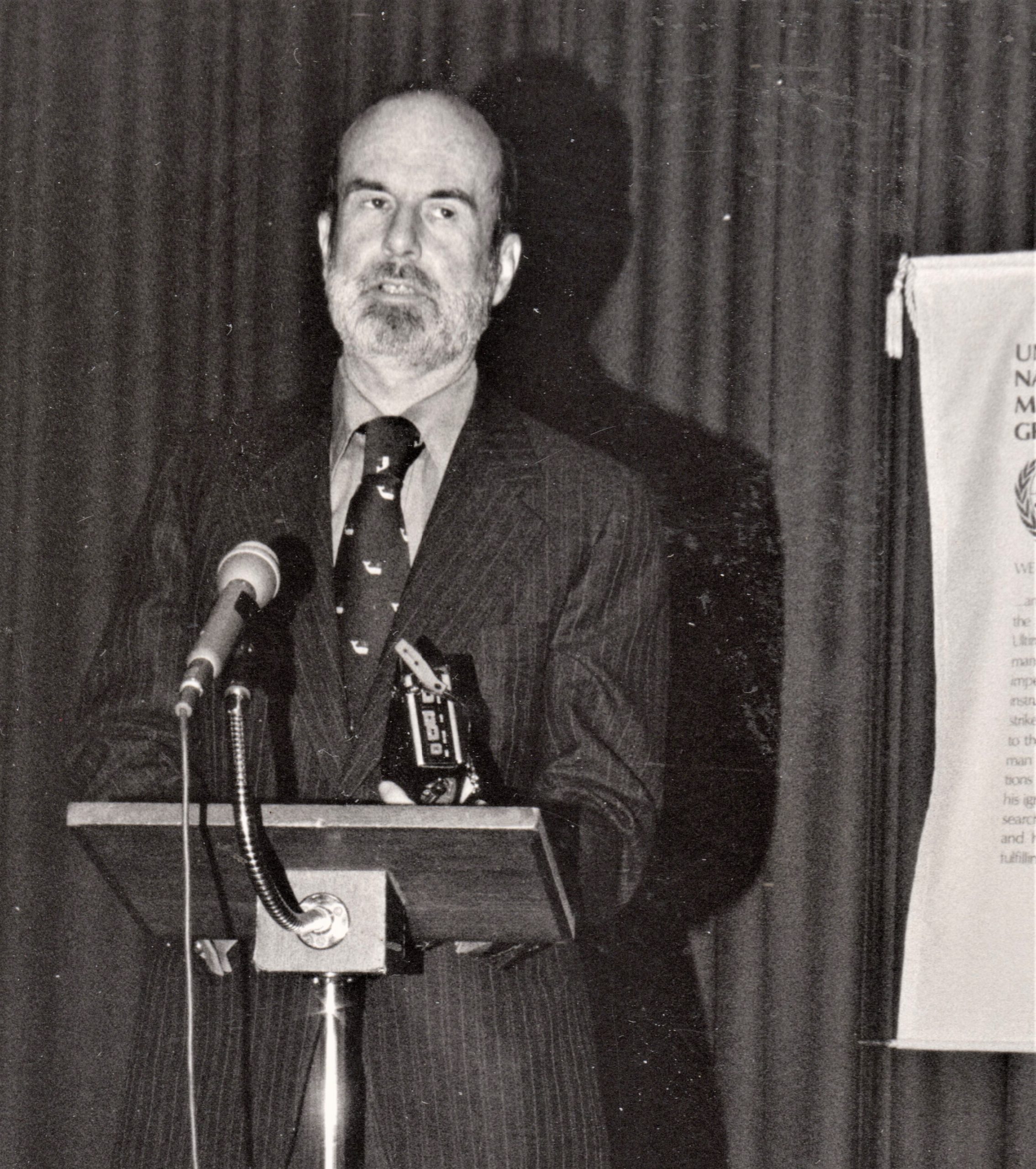
1976-10-01oct-dedicate-to-UN-SG-office-D-Keys-World-Feeralists
Speaker Donald Keys
Sri Chinmoy: Mr. Donald Keys of the World Federalists
Mr. Keys: Whenever I speak about the United Nations, the thing 1 speak most fervently about, and possibly the thing that registers the greatest surprise in the people to whom 1 speak, is the people of the United Nationso Very often, foremost in my mind are sorne of the remarks and the embodied attitude of my dear friend, Roben Muller, because in his own person he embodies to me so much of what the United Nations stands for and is seeking t o becomeo 1 am referring to his enthusiasm, h is dynamism, which is based on deep inner vision, and his long and unfailing contributionso But 1 found that this is characte ristic of many people in the U o N o They are a dedicated band of people who are serving mankind as a whole and seeking to mak e real the vision that stands before the United Nationso So it is in many ways highly redundant for me to follow the previous speaker, as we speak from very much the same attitudeo The Secretary-General is at the top of the pyramid of individuals who are working for this vision and this goal. His tasks are multiple not only because he is the administrator of the UoNo system, which is a complete and total and quite adequate task in itself; not only because he is the representative of the collective worlds of nations, trying to implement the decisions and wishes of the General Assembly and the Security Council, which in itself, again, is a very complete and extraordin-arily difficult task; but also because of the variety of experiences, of cultural histories and back-grounds which the members bring to the world organisation. These various elements are its greatest riches and, at the same time, a temporary source of discord and misunderstanding which the Secretary-General himself must be in the position to harmonise. But, most importantly, the Secretary-General is the spokesman for that which is most incipient, that which is in the process of becoming and being born. The Secretary-General in himself embodies the conscience of the human race, and represents a kind of third force in the world that goes beyond his prescribed, spelled out and specific tasks. He represents that higher force which is seeking realisation and manifestation through a world orgamsm. He speaks for us, the peoples of the United Nations, for the members of the Secretariat who embody that vision and for the many members of the delegations who also stand for and embody that visiono And he, like they, has the very difficult task of responding to national needs and aspirations and, at the same time, trying to embody and respond to a greater vision, the collective vision of the human species with its planetary needs. 19
The United Nations is in the process of elevating and making visible on a planetary level the highest values which humanity has succeeded in enunciat-ing in all its many aspects of living. This concerns everything from the values of caring for children, as manifested in the Declaration of the Rights of Children in UNICEF; to the care for refugees and homeless people, as manifested in the Report of the High Commissioner on Refugees; to the code of human rights, which has become legally binding on a global scale; to the search for international security, disarmament and peace, which takes many forms and represents perhaps the most difficult search of the United Nations. Through every aspect of the United Nations, you can trace the transition to a planetary and species-wide expression of the highest and deepest values of the human race. It is preeminently the Secretary-General who is called upon to embody in himself this quintessence of human values and to stand as its spokesman and adjudicator in the affairs of meno And he must do so armed primarily with the moral force of human conscience, not with political authority-except that which has been grudgingly relinquished by members who, on the one hand, want the U. N. to achieve its goals and, at the same time, are reluctant to allow the world organisation to do so. It is this living dilemma in the state of transitional becoming that the Secretary-General must grapple with in this stage of human history. This is why the post bears such an enormous burden. That task, however, is not borne alone, for the Secretary-Generalship also stands for a group of colleagues who are at the forefront of human vision and achievement. When things are done in the name of the Secretary-General, they represent most often an elaborated consensus which has gone through many hands and embodies the heartfelt expressions of many colleagues.
When, in the future, the United Nations becomes what it is destined to become, it will be in
very large part due to the moral strength, as well as the other capacities, which all the Secretaries-General and their colleagues have been called upon, beyond normal human endurance, to manifest and embody.
- 1976-10-01oct-dedicate-to-UN-SG-office-Robert-G-Muller-Dir-Dep-USG-Inter-Agency-Affairs-Coordination-crp
- 1976-10-01oct-dedicate-to-UN-SG-office-Robert-G-Muller-Dir-Dep-USG-Inter-Agency-Affairs-Coordination-crp-2
- 1976-10-01oct-dedicate-to-UN-SG-office-Sri-Chinmoy-Thanks-Robert-Muller-Dir-Dep-USG-Inter-Agency-Affairs-Coordination-crp
- 1976-10-01oct-dedicate-to-UN-SG-office-don-keys-world-federalists
Gallery 2:
- bu-scpmaun-1976-10-27-vol-04-n-10-oct_Page_07
- bu-scpmaun-1976-10-27-vol-04-n-10-oct_Page_08
- bu-scpmaun-1976-10-27-vol-04-n-10-oct_Page_09
- bu-scpmaun-1976-10-27-vol-04-n-10-oct_Page_09-r-muller
- bu-scpmaun-1976-10-27-vol-04-n-10-oct_Page_16
- bu-scpmaun-1976-10-27-vol-04-n-10-oct_Page_17
- bu-scpmaun-1976-10-27-vol-04-n-10-oct_Page_19
- bu-scpmaun-1976-10-27-vol-04-n-10-oct_Page_19-d-keys
- bu-scpmaun-1976-10-27-vol-04-n-10-oct_Page_23
